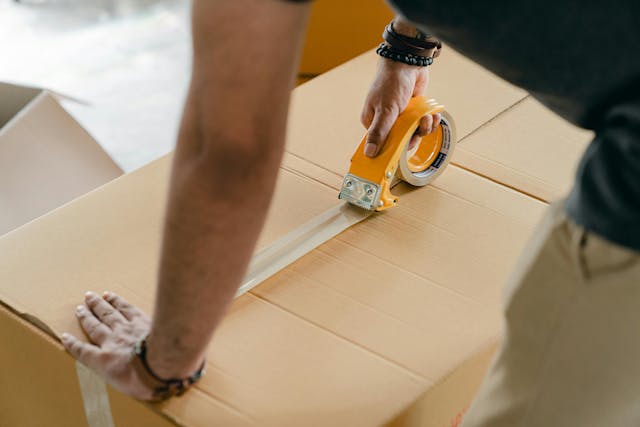E-commerce and second hand: the 5 historic platforms
6 June 2023

In a world where responsible and smart consumption has become the norm, the second-hand market has undergone a real revolution. E-commerce platforms play a major role in this revolution, making it easier to buy and sell pre-owned products. Some have even pioneered this movement. They have changed the way we consume on a daily basis! In this article, we look back at five platforms that have shaped the history of second hand.
Emmaüs: The vintage good deed
Founded in 1949 by Abbé Pierre, the Emmaüs association aims to help the homeless and the most disadvantaged. It develops its own resources to fight poverty. The association was one of the pioneers of the second-hand market by collecting donations of used goods to resell them at affordable prices. Thanks to its network of charity shops, Emmaüs has become a reference in the field. They offer a wide range of products, from clothing to furniture and even electronics.
In 2015, Emmaüs France launched a feasibility study on online sales. The following year, it created Label Emmaüs and launched its second-hand e-commerce site. The first marketplace for reuse and solidarity actors! In concrete terms, it offers an alternative to traditional online sales sites. It allows people to buy online anywhere in France the goods sold locally and to increase the reach of Emmaüs communities.
On our site, listings are created by employees in integration and Emmaüs companions with the support of volunteers. These are also the people who prepare and ship your parcels.
Label Emmaüs
eBay: The auction revolution
Launched in the United States in 1995, eBay is one of the first online sales platforms to have achieved worldwide success. Initially focused on auctions, eBay allows users to sell and buy a wide range of new and used products. The platform has evolved over time by introducing features such as 'Buy It Now' and classified ads. eBay also paved the way for cross-border commerce, enabling sellers and buyers from all over the world to interact on the platform. Today, eBay is one of the most popular sites for buying and selling second-hand goods worldwide.
PriceMinister: The bargain site
Founded in France in 2000, PriceMinister was one of the first online sales sites to offer both new and used products. Its business model is based on directly connecting sellers and buyers, which helps reduce costs and offer competitive prices. PriceMinister experienced rapid growth and expanded its offering to thousands of product categories. In 2010, the site was acquired by Rakuten, a Japanese e-commerce giant, further strengthening its international presence!
Leboncoin: Simplified classifieds
Launched in France in 2006, Leboncoin quickly became the leader in online classifieds. Today, it is one of the most visited sites in France, with over 9 billion page views per month. A generalist platform where you can find everything from vintage furniture to second-hand books and used vehicles. It allows individuals to sell and buy a wide variety of goods. They revolutionised the market by simplifying the sales process with a simple and easy-to-use interface.
The site offers an internal messaging system that allows users to communicate, negotiate prices, and agree on transaction details. Payment and delivery of items are generally done in person, directly between buyer and seller. Delivery is now possible for small items in partnership with Mondial Relay, but remains unavailable for bulkier items. A future logistical challenge for the most popular classifieds site?
Vinted: Second-hand fashion at its best
Vinted is a platform dedicated to buying and selling second-hand clothing launched in 2008. It quickly gained popularity thanks to its unique features. The first is the creation of 'virtual wardrobes' allowing users to showcase and sell their clothes. Vinted also offers exchange options between users, thus encouraging a circular economy and more responsible consumption in the fashion industry.
Delivery and Second Hand: a real logistical challenge
The second-hand market has seen remarkable growth thanks to second-hand e-commerce platforms that have made exchanges between buyers and sellers easier. They have made history by offering innovative solutions and encouraging more responsible consumption. But to grow further, they must face a major challenge: an adapted logistics!
Delivery is indeed a challenge for second-hand sales sites. Unlike traditional online sales sites where transactions are often shipped by standard carriers, second-hand platforms are mainly focused on local or national transactions between sellers and buyers.
However, the most sold items on second-hand platforms are often of various sizes, shapes, and weights, making it difficult to use standardised delivery solutions. Sellers and buyers therefore often have to find personalised arrangements for delivery, which can take time and generate additional costs.
In addition to second-hand e-commerce platforms, co-transportation plays an essential role in the second-hand market. Cocolis enables retailers to easily organise deliveries by using the free space in travellers' vehicles. This approach reduces delivery costs, offers greater flexibility, and helps reduce CO2 emissions related to transport. Cocolis thus strengthens the efficiency and sustainability of the second-hand market, even for larger items!
Contact the Cocolis team to discuss your delivery needs!


